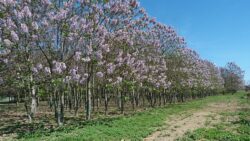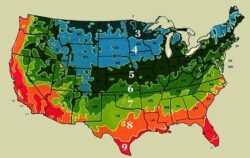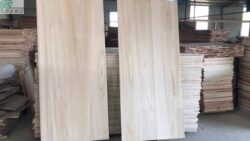Paulownia trees may be the answer to fast reforestation. They suck up CO2 and mature in 10 years. The wood is a s strong as other hardwoods, that take 30-60 years to mature. But hold your horses.
This tree is a native tree of China. Much of the wood is sent to Japan where they make furniture, jewelry boxes and sacred rice bowls. You can also find this tree spread throughout the world in zones 6-9. SE Montana could support this tree.
Empress Trees are also known as Eco Timber. They produce quality lumber quickly and will replant themselves. Existing roots and stumps immediately regrow after harvesting. The roots prevent erosion.
This light but strong wood is also valuable. It can be sold for $3-$14 a board foot. One acre can yield 15,000-30,000 board feet of lumber in just 10 years. That’s well over $90,000 per acre.
The Dept. of Agriculture labels this tree as a Noxious Weed. Connecticut and Tennessee also ban these trees. Despite being fast growers, they have a thin bark that makes damage from mowers and weedwhackers an issue. Cold temperatures will freeze and kill these trees. They also droop and are susceptible to wind damage, when isolated. When planted together, helps protect them. The roots also grow near the surface and tend to send up suckers or volunteers.
One of these trees greatest strengths is that their broad leaves can absorb huge amounts of carbon dioxide. 1 acre will absorb 30 tons of CO2/year. Their leaf litter and seed pods can make great soil but can also form mats that kill other plants. Some find the wood to be brittle and susceptible to cracking.
This tree may not be the answer to replace or compete with native trees, but if placed on manageable tree farms, it could be profitable and useful. These unique trees are also fire resistant. Planting them around the perimeters of other hardwood forests could help to protect them from forest fires. In places like California, where forest fires are a huge deforesting concern, Paulownias could be the answer.
Like Bamboo, Paulownia need to be managed. If allowed to grow wild, they can ruin ecosystems. Bamboo provides no food for native critters and is an invasive plant. At least Empress Trees produce habitat and food that native wildlife can utilize.
If this tree is added to America’s forests, it is so valuable that allowing it to grow wild is a waste of money. Harvesting these trees every decade would be a financial benefit to many landowners while helping with Climate Change issues.
Montana Grant